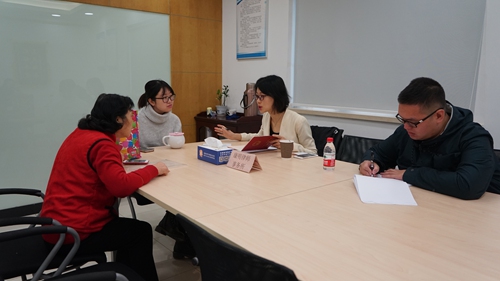HOME >> METRO SHANGHAI
Grass-roots staff making efforts to enhance residents’ basic knowledge of law
Source:Global Times Published: 2019/11/20 19:04:26
Legal literacy

Wu Xinhui (right) offers legal consultation for a woman. Photo: Chen Xia/GT
On a Thursday morning, Wu Xinhui, 34, was sitting at the reception room of the Hongqiao subdistrict of Shanghai, dressed formally. Wu is a lawyer, who has practiced for more than 10 years. She has served as a volunteer lawyer in this sub-district for seven years, providing legal counsel to the residents. This was the start to another day on the job.
A 70-year-old woman approached Wu, seeking help to deal with a family property conflict. "I want to protect my legitimate rights and interests," the woman surnamed Liu said. Wu carefully listened and suggested that she follow some steps to protect herself.
Over the course of an hour, five residents came to Wu who patiently gave the residents detailed explanations and suggestions.
"Sometimes I was busy with my job in the law firm, my colleagues will do the same job instead of me," said Wu.
Besides legal services, the subdistrict office deals with many cases - mostly family disputes. "My job is to coordinate the family disputes, to reduce the conflicts as much as possible," Jiang Wenting, a four-star coordinator, who has been working in this subdistrict for eight years, told the Global Times.
"I used to work in a company as a white-collar worker, but gradually I was fond of my current job," Jiang said. "Though I dealt with family issues every day, I felt satisfied and valued if I could help people."
The family disputes vary, but are mostly related to properties, marriage and senior healthcare, said Wu.
Voices from residents
Due to the efforts made by people like Wu and Jiang, residents in the Hongqiao subdistrict have more legal knowledge. More than 80,000 residents are living in this subdistrict, including 18,000 expats. The community has a solid foundation to serve as trial ground for legislative affairs.
At the end of July 2015, the Hongqiao subdistrict was chosen as one of the four grass-roots communities on legislative matters by the Commission of Legislative Affairs of the National People's Congress. The other three are located in Xiangyang, Central China's Hubei Province, Jingdezhen, East China's Jiangxi Province and Lintao, Northwest China's Gansu Province.
Besides working as a lawyer, Wu is a coordinator in the subdistrict, responsible for soliciting residents' suggestions on legal matters. Wu recalled a case she dealt with several years ago.
According to Wu, a senior citizen in her 90s suffered family violence.
"The draft Anti-Domestic Violence Law protects children and women a lot," Wu told the Global Times.
"In fact, the senior citizens, especially those living with their children also need more help," Wu said.
As a coordinator, Wu proposed the amendment at a consultation meeting in September 2015.
"I have dealt with many similar cases, which inspired me to propose the suggestion that the Anti-Domestic Violence Law should also include seniors," Wu told the Global Times.
During the consultation, a total of 11 suggestions were reported to the Commission of Legislative Affairs of the NPC Standing Committee, with two of them eventually being adopted.
Finally, the provision that "the elderly suffering domestic violence shall be given special protection" was added into the Anti-Domestic Violence Law.
Rising legal awareness
Zhu Guoping was grateful that citizen's suggestions were adopted. She had been working as the director of the neighborhood committee of the Hongchu community in Hongqiao subdistrict for nearly 30 years. Zhu became a coordinator in 2015.
Two decades ago, she was busy mediating family conflicts, which took up most of her time, Zhu told the Global Times.
"Now it's different. With the improvement of law, we can deal with these similar family conflicts in a legal way," Zhu said.
"I hope the mode could be spread into more communities that more residents could benefit from it," Zhu said.
With rising legal awareness, more residents are capable of expressing their opinions and participating in more legal activities, according to Zhu.
During the seven years of Wu's service in Hongqiao subdistrict, Wu and her law firm have provided up to 2,000 hours of legal services.
On another Thursday morning, Wu again walked into a meeting room, sitting down with representatives including local residents, Changning district judges and an expat teacher, to have a discussion over a draft law on the prevention of juvenile delinquency.

Photo: VCG
Posted in: METRO SHANGHAI